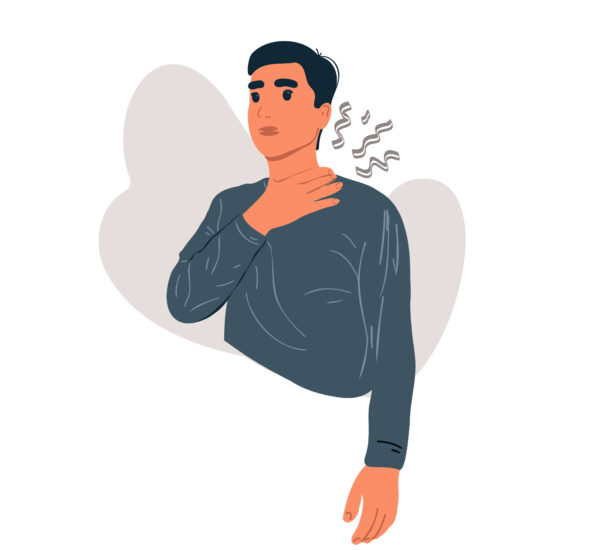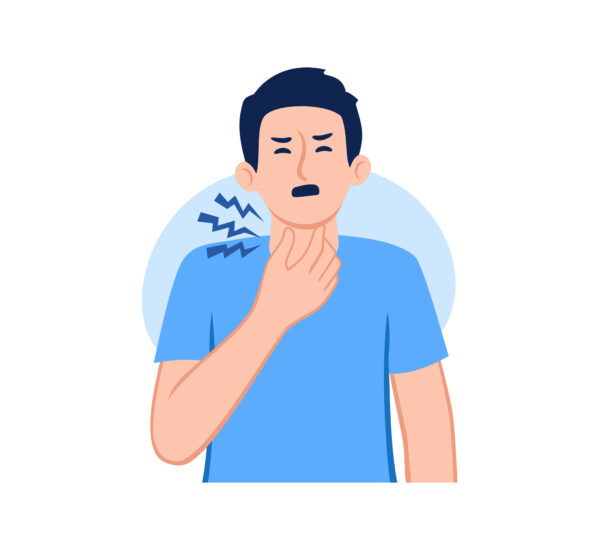Excruciating pain brought by sore throat is not easy to ignore, especially as it takes out the joy from eating food. The constant pain makes every individual have a hard time swallowing due to intense pain. Unfortunately, this scenario is a common initial symptom of flu and cold.
The throat is an important part of the digestive system, but is also a crucial part of the immune system. If the throat is compromised, that means viral infection has breached the body system, resulting in soreness. Thus, it can lead to the mentioned respiratory conditions.
In this blog, we’ll uncover the crucial details and how to combat it to avoid occurrence or its recurrence. Discover how to soothe this painful condition. Let’s begin!
Understanding Sore Throat

A sore throat, also known as pharyngitis, is characterized by pain, scratchiness, or irritation in the throat. This condition is commonly associated with the occurrence of flu or cold, which means it occurs due to viral infection exposure. These viral infections can inflame the throat, leading to discomfort and pain. In most cases, viral sore throats resolve on their own without medical intervention. Adequate rest, hydration, and over-the-counter pain relievers can help manage the symptoms and promote healing.
Aside from viral infection, sore throat can also occur through bacterial infections. Bacterial infections such as streptococcal pharyngitis or strep throat, is caused by the bacterium Streptococcus Pyogenes. It is characterized by severe throat pain, fever, swollen lymph nodes, and white patches or pus on the tonsils. This condition requires medical treatment with antibiotics. If left untreated, strep throat can lead to complications such as rheumatic fever.
Both types of sore throat are both alarming and must be resolved immediately. If you have a sore throat, it’s best to seek immediate help to address the issue. That way, you can receive appropriate medications needed or effective remedies,
Common Causes of A Sore Throat
While some of the factors that may result in the development of sore throat were revealed, there are still other triggers that can contribute to its occurrence. These factors may include the following:

Common Cold
Common cold is a viral infection that can lead to a sore throat. It is characterized by symptoms such as a runny nose, congestion, cough, and sneezing. The viruses causing the common cold can inflame the throat, resulting in discomfort and pain.
Irritants
On the other hand, irritants can also be a contributing factor that can result in sore throat. Irritants such as pollution, tobacco smoke, and other chemicals can lead to inflammation and discomfort. That’s why most smokers may have hoarse voices due to an irritated throat from exposure to such irritant.
Dry Throat
Meanwhile, this scenario commonly occurs if the person has a habit of breathing through the mouth occasionally. For instance, the patient has trouble breathing due to nasal congestion, thus making them choose the mouth for breathing. Unfortunately, it can irritate the throat, making it prone to scratching, and lead to sore throat.
Underlying Conditions
Aside from the mentioned factors, there are also other instances that health conditions can also lead to sore throat. These conditions may involve or affect respiratory health, which results in this outcome. Some of the known illnesses that may result sore throat are the following:
- tonsillitis
- gastroesophageal reflux disease (GERD)
- laryngitis
- hiv
Sore Throat in Adult vs Sore Throat in Children
While sore throats can affect individuals of all ages, there are certain differences in how they present in adults and young children.
Sore throat in adults is often a symptom of an underlying condition, such as a viral or bacterial infection, allergies, or acid reflux. Meanwhile, sore throat in children is commonly caused by viral infections, including common colds and the flu.
Both conditions can possibly affect the patients greatly. That’s why it is crucial to monitor the possible warning signs and to seek immediate help.
Identifying Symptoms of a Sore Throat
Recognizing the symptoms of a sore throat can help patients to determine the appropriate course of action for their health. By knowing these warning signs, they can identify whether or not medical attention is necessary.
Here are the common symptoms of a sore throat:
- Throat pain or discomfort
- Pain that worsens with swallowing or talking
- Difficulty swallowing
- Sore, swollen glands in the neck or jaw
- Swollen, red tonsils
- White patches or pus on the back of the throat
- Noticeable hoarseness of the voice

When Symptoms Indicate More Than Just a Sore Throat
There are instances wherein a sore throat is often a benign condition that resolves on its own. Meanwhile, other instances may indicate a more serious underlying condition. It is important to be aware of these signs and seek medical attention if necessary.
Here are the possible symptoms that may show more complications:
- Difficulty breathing or swallowing: This could be a sign of a more severe infection or obstruction in the airway.
- Trouble opening the mouth: If you experience difficulty opening your mouth or have joint pain associated with a sore throat, it may indicate a more serious condition.
- Severe or persistent fever: A persistent high fever, especially in combination with other symptoms, may indicate an infection that requires medical intervention.
- Presence of blood in saliva or phlegm: Blood in saliva or phlegm can be an alarming sign and should be evaluated by a healthcare professional.
- Severe or worsening symptoms: If your symptoms worsen or become increasingly severe, it is important to seek medical attention.
These symptoms are possibly related to a severe type of sore throat such as strep throat. If you suspect you may have a severe type of sore throat and are experiencing severe symptoms, it is important to seek medical attention promptly to prevent potential complications.
Knowing When to See a Doctor

While most sore throats can be managed at home with self-care measures, there are circumstances where medical attention is necessary. When such a type of sore throat occurs, it is crucial for patients to visit a health care professional immediately. That way, they can examine the area, as well as check whether the conditions have resulted in the rising of other complications.
Moreover, trusting a doctor can help you manage your condition better. These health care professionals have the expertise to provide early intervention with the tailored treatment options based on your condition.
Take note that all types of health risks must be observed and analyzed properly by doctors. In the case of a sore throat, if you are suffering from such a health condition, seeking immediate help is a great option.
Medical Treatments for Persistent Sore Throats
In cases of persistent sore throats or severe sore throats, medical treatments may be necessary. Depending on the underlying cause and severity of the sore throat, different treatment options may be considered. Let’s analyze the possible treatment options below!
Over-the-Counter Solutions
Over-the-counter solutions can provide temporary relief for sore throats and help alleviate symptoms. These remedies can be used in conjunction with self-care measures to manage a persistent sore throat. Some over-the-counter options include:
- Throat lozenges
- Cough syrups
- Pain relievers: (NSAIDs or Acetaminophen)
- Throat sprays
- Warm liquids
It is important to read and follow the instructions on the packaging of over-the-counter remedies and consult a healthcare professional if you have any concerns or questions.
When to Consider Antibiotics
If the other option won’t work, it’s time to utilize stronger remedies, which antibiotics can provide. Antibiotics are commonly prescribed for bacterial infections, including strep throat. However, not all sore throats require antibiotics, as most are caused by viral infections that resolve on their own.
Commonly prescribed antibiotics for strep throat include:
- penicillin
- amoxicillin
- erythromycin
It is important to take antibiotics as prescribed and complete the full course of treatment to ensure effective eradication of the bacteria and prevent complications.
Prevent Recurring Sore Throats
Now that you understand the possible effect of sore throat to one’s health, it is vital to be ahead of the game to prevent its occurrence again. Prevention is key when it comes to sore throats. By taking proactive measures, you can reduce your risk of developing another sore throat. Here are some tips to prevent sore throats:
- Drink warm liquids: Consuming warm liquids, such as herbal teas or warm water with honey and lemon, can help soothe the throat and reduce irritation.
- Stay hydrated: Drinking plenty of fluids, such as water and clear broths, can help keep the throat moist and prevent dryness.
- Use a humidifier: Adding moisture to the air in your home by using a humidifier can prevent dryness in the throat.
- Avoid irritants: Minimize exposure to irritants, such as smoking, secondhand smoke, and chemical pollutants, as they can irritate the throat and exacerbate symptoms.
- Suck on hard candies: Sucking on hard candies or throat lozenges can provide temporary relief by stimulating saliva production and reducing throat irritation.
By incorporating these lifestyle changes into your daily routine, you can promote throat health and reduce the likelihood of developing sore throat.
Final Takeaway
Whether it’s viral or bacterial, knowing when to seek medical advice plays a key role in your recovery from sore throat. Doing so allows you to manage the condition before it worsens such as developing unwanted health risks.
So, if you suspect that your symptoms are possibly an emerging sign of sore throat, it’s best to seek help from a doctor. Remember, taking proactive steps towards throat health is essential for your overall well-being. Your health matters, so prioritize it wisely.
Sore Throat Knowledge Quiz
Test your knowledge about sore throat causes, symptoms, and treatment
You scored out of 5


